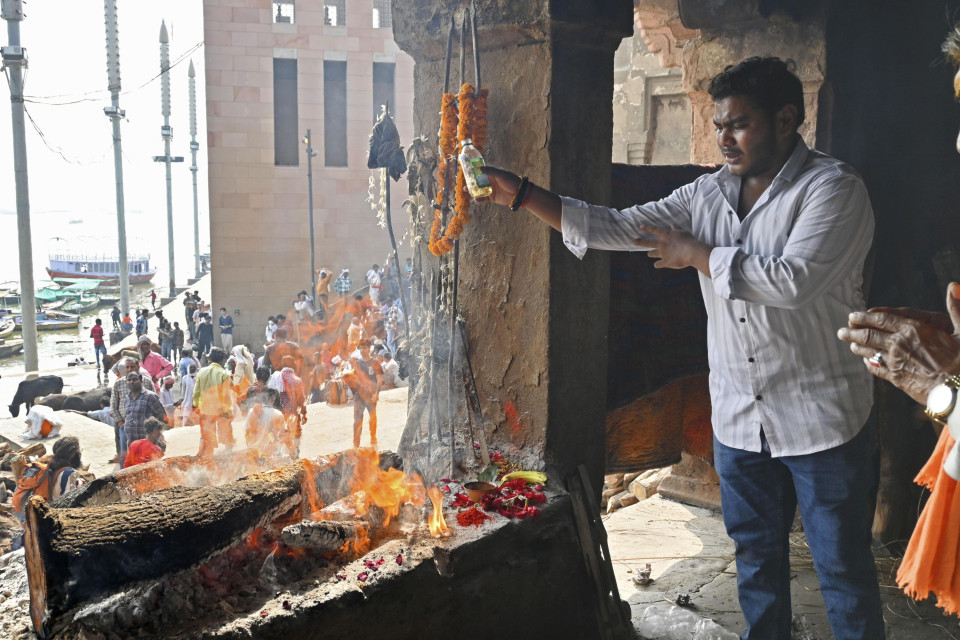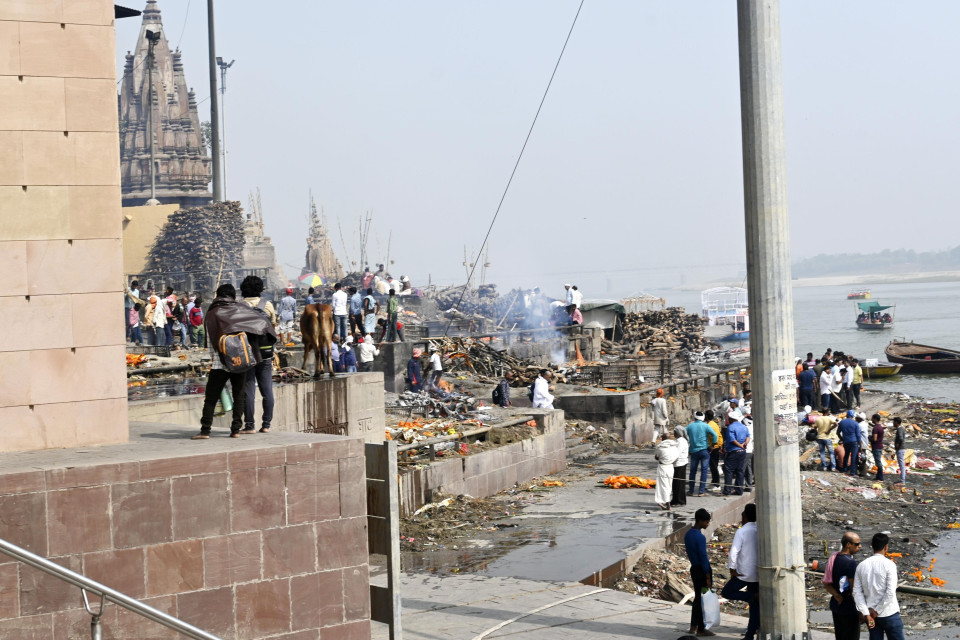In the holy Indian city of Varanasi, on the banks of the mighty Ganges River, lives a "crematorium king," who with his family manages the continuously burning pilot light for cremating the dead.
Two tiger statues placed on balustrades on either side of the building's terrace identify it as the site where the crematorium king conjures up the souls of the dead, a rite held sacred to all Hindus.
But the king, the current position held by 19-year-old Om Chaudhary, and his family are also considered untouchables of the Dom community, the lowest in the traditional caste system where they struggle due to discrimination and poverty.
However, Chaudhary, who in 2020 ascended as king after his father's untimely death and is one of the youngest among the family lineage to who have performed the rite since the city's inception, is also revered by Hindus for the pure and spiritual work he performs.

"As a kid when I went (to the place where dead bodies are cremated), I was always accompanied by my father, and his intention was...to train me about our tradition that our family has been following from generation after generation," Chaudhary said.
In its role as a sacred city, Varanasi in the Indian state of Uttar Pradesh houses the largest cremation grounds called the Manikarnika Ghat. There are more than 80 ghats, steps leading to the riverfront where bodies are cremated on wooden pyres.
Hindus believe if their remains are burned and released into the purified Ganges, they will reach Nirvana -- achieving the end of the rebirth cycle -- or Moksha, considered the ultimate goal of life in their religion.
Processions of bereaved families loudly chanting funeral prayers arrive, carrying bodies on bamboo stretchers wrapped in orange, red, and other brightly colored cloths. The pilot light that feeds the funeral pyres, which is said to have been burning for centuries, is maintained by Chaudhary in the building overlooking the entire area.
As Dom Raja, the king of inheritors of the legacy, Chaudhary starts his mornings early, praying to his ancestors and for the pilot light in front of the ghats. Some 90 people are in his employ.
The building is guarded 24/7, 365 days a year to keep the pilot light burning. Its interior is thickly covered in black soot, which stings the eyes when one enters the sanctuary.
"After I reach the ghat, I first organize a prayer ceremony for our ancestors who started this work of cremation here and all of our staff participate in it," Chaudhary said.
At most, as many as 150 bodies are collected per day at Manikarnika. The cost of cremation starts at 3,000 rupees (about $36), but depending on the quality of the wood used and the lavishness of the decorations, the total can run several times or even dozens of times higher. The cremation king only receives an officially set fee of 500 rupees for providing the pilot light.
As the lowest in India's caste system, untouchable Dom people have been historically discriminated against, with others in Indian society avoiding even being in their presence. In the past, the fire keeper fee was kept so low "we couldn't even afford one meal a day," said Chaudhary.
At times, because of extreme penury, the family's home was turned into a brothel. Successive cremation kings have made efforts to change those conditions.
Besides taking care of the cremation service as a king, Chaudhary also checks the daily affairs happening at the ghats and assigns duties to his staff.
Chaudhary lost his father, Jagdish Chaudhary, the former king, when he was just 15 years old. Since then, he has actively taken on all the roles his father once performed.
"He never treated himself as the king of the Dom community, rather he devoted himself completely to the people and society through his work," said Chaudhary, adding that he took his inspiration from his father's social activities to motivate him on his path as the Dom King.

Jagdish Chaudhary was adamant that none of the people nor their families in the Dom community, who are engaged in various occupations besides cremation, face discrimination. There are said to be some 100,000 people in the Dom community.
The father was posthumously recognized for his contribution to society and was awarded the Padma Shree, India's fourth highest civilian award, which his son, the new king, received on his behalf.
Through sheer numbers and political power, the Dom people have raised the pilot light donation fee to a level that the king and his family can now live on.
His father would walk around the community, helping other poor families financially, and acting as a social worker. He was very fond of Chaudhary as a child, and would also take his son to the ghats and lecture him on the king's responsibilities.
When his father died in his mid-50s, Chaudhary found himself overwhelmed by the burden he had inherited.
But he says now, "I am positive that in the future I will be able to help others just like my father and make him proud," he said, adding that the way people view Dom people today has rapidly changed.
Chaudhary, who also trains as an amateur wrestler in his spare time, tries to fit in with modern times while keeping alive the tradition that was deeply instilled in him since childhood.
Although discrimination still persists in India on a whole, Chaudhary said, "I don't regard people who still believe in the caste system and discriminate among the communities as genuine people, because we are fortunate to have been born as human beings and all of us need each other in order to survive in this world."
Related coverage:
FEATURE: Okinawan Spam soul food sandwich on a roll worldwide
FEATURE: 1,000-km nature trek helping Tohoku once again hit its stride
FEATURE: 3 yrs after coup, Japan group strives to aid displaced Myanmar people
 By Rini Dutta,
By Rini Dutta,









 By Mei Kodama,
By Mei Kodama,